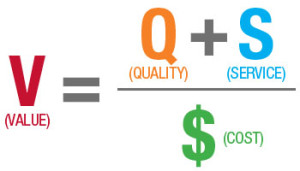
Defining Healthcare Value
One of the greatest challenges in healthcare currently is not so much a matter of practice, but definition. How has healthcare ‘value’ been defined and do we need to alter our definition to reflect the ongoing evolution of our healthcare system?
Historically, healthcare value has always been defined in healthcare as the intersection between the highest quality care available for the lowest possible cost. Essentially, value as it applies to services exists at the crux between providing competitive, high-quality services to patients to meet economical demand while also being cost-effective for not only patients, but payers and physicians.
As you might imagine, this is no small task. High quality care, it stands to reason, that integrates new technology and fresh-off-the-market services is going to come at a higher price.
Defining Value in Terms of Patient Care
Ideally, healthcare value should be defined in terms of the patients receiving care. But since healthcare follows a fairly inflexible business model, often times the qualification of value falls more on the cost end of the spectrum: are we getting as much as we can for as little as possible?
Superficially, it might seem entitled or greedy of us to approach healthcare from this standpoint. But the reality is, the United States spends the most money annually on health care of any nation, yet the quality of our healthcare (compared to other nations) is actually subpar.
Defining Value in Terms of GDP
If we are spending such a large percentage of our GDP on healthcare each year, and we have historically equated how much we spend with the quality of the care we have available, then why isn’t our healthcare also ranking number one?
When we talk about healthcare reform, what we ultimately are looking at is the “why” behind this economic conundrum; could it be that how much we spend is not directly proportional to the height of quality for the care we essentially purchase?
It may seem to be a simple answer. If we look only at the numbers it would stand to reason that no, more money spent on services does not necessarily equate better care and, in fact, it may be detrimental to a healthcare system on the whole.
Defining value as we do now, getting more for less, it would seem that we are continuing to practice unsustainable trends in how we approach the purchasing of healthcare services. But it may not be so simple.
The Changing Face of Value
We are now moving toward a model that focuses more on value and awards payment accordingly. In other words, if your patients do well, you do well. If you are able to provide services cost-effectively, you’re rewarded as a physician. Hypothetically. But now we see ourselves teetering to the other end of the spectrum that we were on back in the days when physicians could prescribe services and treatments willy-nilly and be paid regardless. The pendulum having swung to the other extreme, now patient care suffers because physicians feel limited in their prescribing power, in an attempt to keep costs down.
Thus is the ideal that we ought to, somehow, provide the same high quality care we once did when we were able to prescribe without much thought to cost, but do it in a way that is cost-effective, when the market prices for services have not changed- or, if anything, they’ve risen.
Physicians now must practice, and patients be treated, in a healthcare system where value is still being defined. The active process could, in the right circumstances, lend itself to positive reform of the system that is currently not economically sustainable. But defining value must be an all- inclusive process that brings in physicians, payers and patients – and truthfully, for each, the definition will always be seen through a slightly different lens.
BHM Healthcare Solutions is a healthcare management consulting firm whose specialty is optimizing profitability while improving care in a variety of health care settings. BHM has worked both nationally and internationally with managed care organizations, providers, hospitals, and insurers. In addition to this BHM offers a wide breadth of services ranging including healthcare transformation assistance, strategic planning and organizational analysis, accreditation consulting, healthcare financial analysis, physician advisor/peer review, and organizational development.





